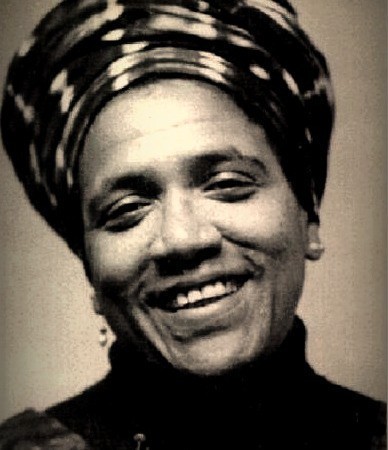The Integrated Beloved Sun, 28th January, 2018
As part of my effort toward my own personal and spiritual formation, I'm happy to be returning to my Sunday Morning Blog each week. My journaling here will be inspired by my readings, thoughts and reactions each week in my Introduction to Spiritual & Personal Formation course.
This first week is challenging me already, as I sit with two seemingly very different texts from Catholic Priest Henri Nouwen and black womanist lesbian poet Audre Lourde. Nouwen’s small book, Life of the Beloved, is a broad statement of theology using everyday language, structured as a conversation between two close friends. Lourde’s work, interpreted in this reading by Pamela Ayo Yetunde, Th.D. at United Theological Seminary of the Twin Cities, is one that speaks of a theology that grows out of deep personal struggle and a desire to be liberated from oppression.
My first reaction to the thought of looking for common linkages in these two texts was that it’s impossible—they are vastly different and coming from opposite poles of social location: on one end, a white male clergyman representing the most powerful and pervasive Christian faith tradition; on the other, a black female lesbian with no formal theological training, whose life represents on many fronts the struggle against oppression. But there is a thread that connects them.
For Nouwen, he is writing to his dear friend, Fred, and trying to convey a sense of what is most important for him and his friends to know about spirituality. He develops a four-part approach that essentially equates to a communion blessing: taking the bread, blessing it, breaking it and sharing it. This means we are all “taken” or chosen by God as beloved beings, which from my Unitarian-Universalist perspective I equate with inherent worth and dignity. We can then, in Nouwen’s construct, use this special status that we all share to bless each other. Next we must accept that, despite being the Beloved, that we are all broken in our own way and suffer pain, most often the pain of rejection and alienation. And finally we can give our lives as a gift to benefit others.
For Lourde, the essential point I took from the reading was the womanist perspective, which Yetunde characterizes as “an attitudinal process that starts with value being placed on being
human, takes account of our sex, race, sexuality, and culture, and ends with a celebration of Black women’s preciousness” (Yetunde, “Audre Lorde’s Hopelessness and Hopefulness: Cultivating a Womanist Nondualism for Psycho-Spiritual Wholeness”). For Lorde, the womanist perspective includes “nondualism,” which embraces the integrated soul, the unity of life, and a fusing of “I” with “the other.”
What I see as the common element connecting these two approaches is our inherent worth—our status as the Beloved, in Nouwen’s language, or the claiming of black women’s humanity, dignity and power, in Lourde's approach. Despite our suffering, our brokenness, we have the power to bless and uplift each other.
Nouwen recounts one of his spiritual epiphanies as he responded to the mentally disabled people who were in his care. They asked him for a blessing. After an awkward attempt to give them the standard Catholic priestly blessing, it soon become clear what they really wanted: to be embraced and told of the unique gifts they bring to the world and how precious they are.
This reminds me of a lay-led Thanksgiving service that I created several years ago, in which I counted the members of the congregation as blessings to our shared community. I found great power in naming individuals, and saying why we as a community are grateful for them. A dear friend had questioned the use of “blessed,” perhaps misunderstanding it as a claim to religious superiority and divine favor over and above others. Nouwen makes it clear that this is not the case, that each of us has a special status as one of the Beloved. Even more important for me, we have the ability to bless each other. We do this when we truly see each other, call each other by name, notice the good, and give our sincere hope for their spiritual and physical wellbeing.
We must do all we can to embrace our own self worth, and remember to pause from our busy-ness and reach out to give blessing to our fellow beings at every possible opportunity.
As part of my effort toward my own personal and spiritual formation, I'm happy to be returning to my Sunday Morning Blog each week. My journaling here will be inspired by my readings, thoughts and reactions each week in my Introduction to Spiritual & Personal Formation course.
This first week is challenging me already, as I sit with two seemingly very different texts from Catholic Priest Henri Nouwen and black womanist lesbian poet Audre Lourde. Nouwen’s small book, Life of the Beloved, is a broad statement of theology using everyday language, structured as a conversation between two close friends. Lourde’s work, interpreted in this reading by Pamela Ayo Yetunde, Th.D. at United Theological Seminary of the Twin Cities, is one that speaks of a theology that grows out of deep personal struggle and a desire to be liberated from oppression.
My first reaction to the thought of looking for common linkages in these two texts was that it’s impossible—they are vastly different and coming from opposite poles of social location: on one end, a white male clergyman representing the most powerful and pervasive Christian faith tradition; on the other, a black female lesbian with no formal theological training, whose life represents on many fronts the struggle against oppression. But there is a thread that connects them.
For Nouwen, he is writing to his dear friend, Fred, and trying to convey a sense of what is most important for him and his friends to know about spirituality. He develops a four-part approach that essentially equates to a communion blessing: taking the bread, blessing it, breaking it and sharing it. This means we are all “taken” or chosen by God as beloved beings, which from my Unitarian-Universalist perspective I equate with inherent worth and dignity. We can then, in Nouwen’s construct, use this special status that we all share to bless each other. Next we must accept that, despite being the Beloved, that we are all broken in our own way and suffer pain, most often the pain of rejection and alienation. And finally we can give our lives as a gift to benefit others.
For Lourde, the essential point I took from the reading was the womanist perspective, which Yetunde characterizes as “an attitudinal process that starts with value being placed on being
human, takes account of our sex, race, sexuality, and culture, and ends with a celebration of Black women’s preciousness” (Yetunde, “Audre Lorde’s Hopelessness and Hopefulness: Cultivating a Womanist Nondualism for Psycho-Spiritual Wholeness”). For Lorde, the womanist perspective includes “nondualism,” which embraces the integrated soul, the unity of life, and a fusing of “I” with “the other.”
What I see as the common element connecting these two approaches is our inherent worth—our status as the Beloved, in Nouwen’s language, or the claiming of black women’s humanity, dignity and power, in Lourde's approach. Despite our suffering, our brokenness, we have the power to bless and uplift each other.
Nouwen recounts one of his spiritual epiphanies as he responded to the mentally disabled people who were in his care. They asked him for a blessing. After an awkward attempt to give them the standard Catholic priestly blessing, it soon become clear what they really wanted: to be embraced and told of the unique gifts they bring to the world and how precious they are.
This reminds me of a lay-led Thanksgiving service that I created several years ago, in which I counted the members of the congregation as blessings to our shared community. I found great power in naming individuals, and saying why we as a community are grateful for them. A dear friend had questioned the use of “blessed,” perhaps misunderstanding it as a claim to religious superiority and divine favor over and above others. Nouwen makes it clear that this is not the case, that each of us has a special status as one of the Beloved. Even more important for me, we have the ability to bless each other. We do this when we truly see each other, call each other by name, notice the good, and give our sincere hope for their spiritual and physical wellbeing.
We must do all we can to embrace our own self worth, and remember to pause from our busy-ness and reach out to give blessing to our fellow beings at every possible opportunity.

